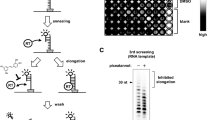Abstract:
The hepatitis C viruses (HCVs) are a group of small enveloped RNA viruses that have been viewed as a leading cause of chronic hepatitis in humans. Infections by HCV represent a serious global health problem, because millions of people worldwide are infected and no efficient treatment is available at the present time. Since HCV was identified in 1989, considerable effort has been devoted to the discovery and development of novel molecules to treat HCV-related diseases. One of the approaches is the development of novel inhibitors that interrupt the normal functions of HCV NS5B, an RNA-dependent RNA polymerase essential to HCV replication. This review summarizes recent advances in the biochemical and structural understanding of HCV NS5B polymerase as well as in the development of antiviral agents targeting this important enzyme.
Similar content being viewed by others
Author information
Authors and Affiliations
Additional information
Received 19 March 2002; received after revision 23 April 2002; accepted 23 April 2002
Rights and permissions
About this article
Cite this article
Lévêque, VP., Wang, Q. RNA-dependent RNA polymerase encoded by hepatitis C virus: biomedical applications. CMLS, Cell. Mol. Life Sci. 59, 909–919 (2002). https://doi.org/10.1007/s00018-002-8478-7
Issue Date:
DOI: https://doi.org/10.1007/s00018-002-8478-7




